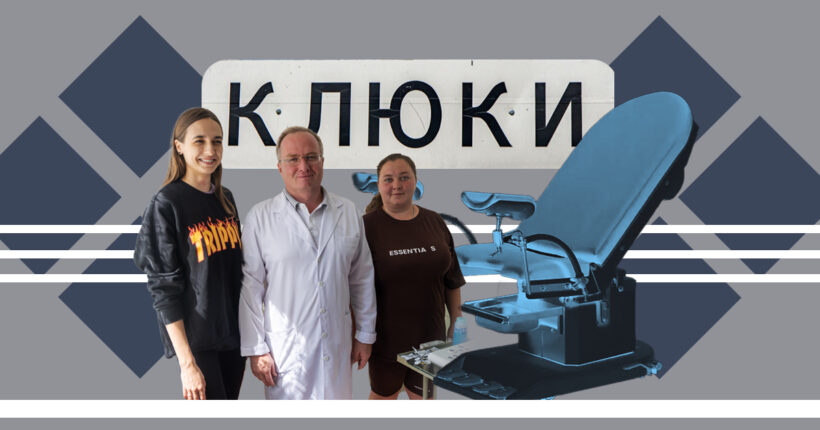
What is the problem?
Millions of Ukrainian village citizens need better access to quality medical services. The full-scale war affected the ability of local authorities to support rural medicine. There is a lack of established medical infrastructure and qualified medical personnel. Such is the situation, particularly with the receipt of gynecological services by women living in remote settlements.
What is the solution?
Mobile gynecological teams are a service created by UNFPA, the United Nations Population Fund in Ukraine, which helps to solve the problem of the availability of gynecological services for women in villages. The teams provide accessible and effective medical assistance in sexual and reproductive health.
The mobile gynecological brigade of the Kyiv region, created on the basis of the Kyiv regional perinatal center, a communal non-profit enterprise of the Kyiv regional council, has been visiting all settlements that submit applications for examinations to a gynecologist specialist since October 2022. The region is large, and many women are willing to be examined in such settlements. In many villages, women receive such out-of-town services for the first time.
How does it work?
Yesterday there were 18 patients, and the same number has been registered today
The mobile gynecological brigade of the Kyiv region began its August trips with Klyuky, a village on the outskirts of which is the southernmost point of the Kyiv region. The distance from the building of the regional perinatal center, from where the brigade starts, to the Klyuky paramedic post is 188 kilometers. These are the first visits of the brigade to remote settlements of the former Tetiivskyi and now Bilotserkivskyi district.
Usually, a mobile gynecological team consists of an obstetrician-gynecologist, a family doctor or therapist, a nurse or midwife, and a driver.
This week, obstetrician-gynecologist Oleksandr Svyatnenko, midwife Vita Myrets, and driver Volodymyr Smolyar are on shift. Intern physician Alyona Lagunenko also joined the team for three days.
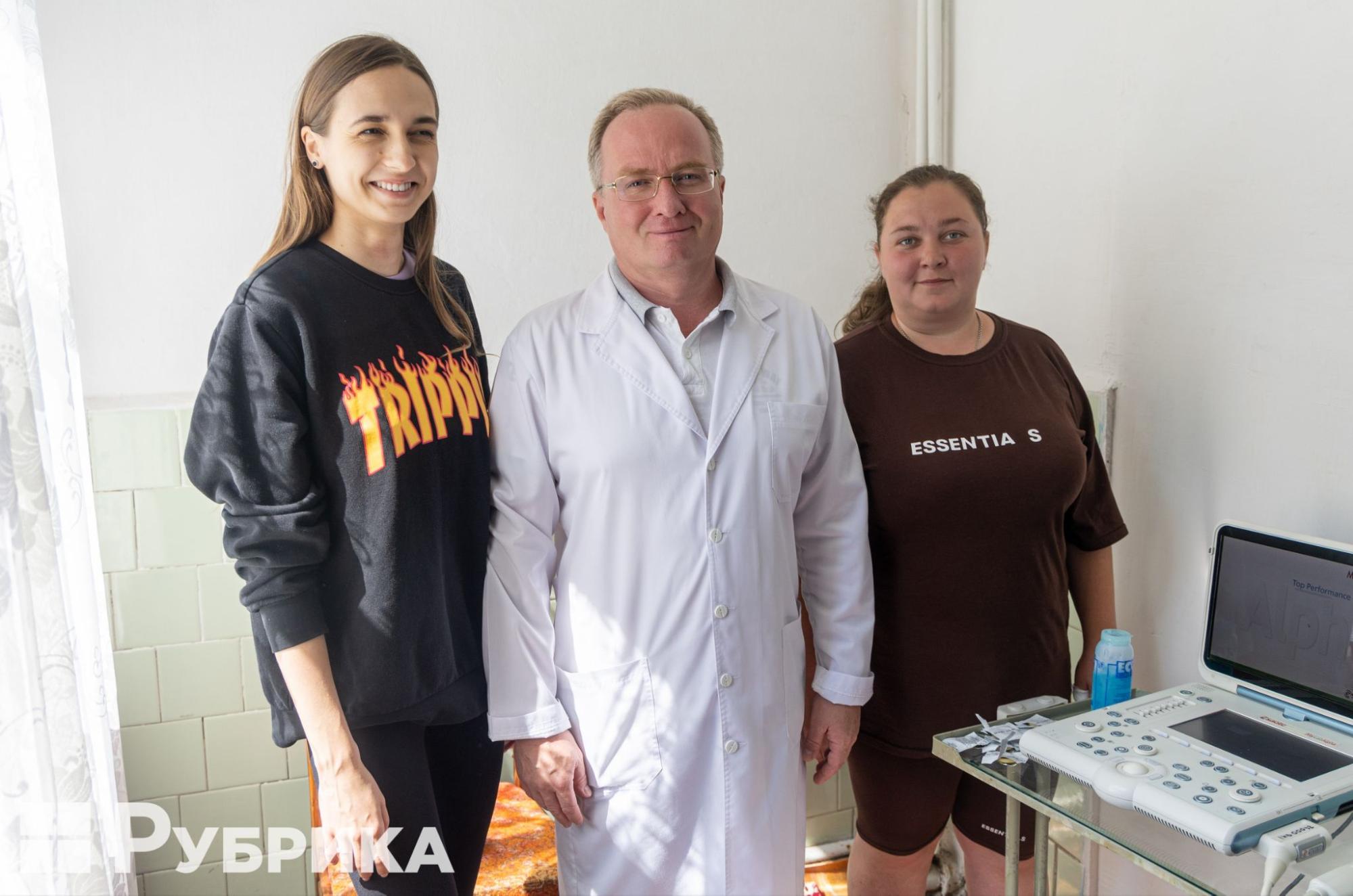
Intern doctor Alyona Lagunenko, doctor of the mobile brigade Oleksandr Svyatnenko and midwife Vita Myrets before starting work in Klyuky
Doctors load consumables into the car (disposable examination kits, materials for blood sampling, etc.), a portable ultrasound machine — and we set off.
"Our goal is to help women"
The brigade team says that the work itself does not tire them, but the long journey does. Yesterday, they made their first trip to Klyuky and warned that the last several tens of kilometers of the journey would be on a bad surface, but the women there are very much waiting for the specialists: yesterday, there were 18 patients, and the same number have signed up today. The road takes two and a half hours one way.
The doctor says some women come for a preventive examination to check their health. The other part complains, and mainly these are complaints about pain, cycle disorders, and bleeding. Sometimes patients need counseling about contraception.
"We help everyone: explain the situation, prescribe drugs, we can even provide contraceptives themselves," says Svyatnenko. "Also, during the examination of each woman, I pay attention to whether there are any signs of violence. So far, I have not encountered such problems, and the patients have not complained. Maybe they are too shy to tell, but we also advise on issues of sexual and gender-based violence."
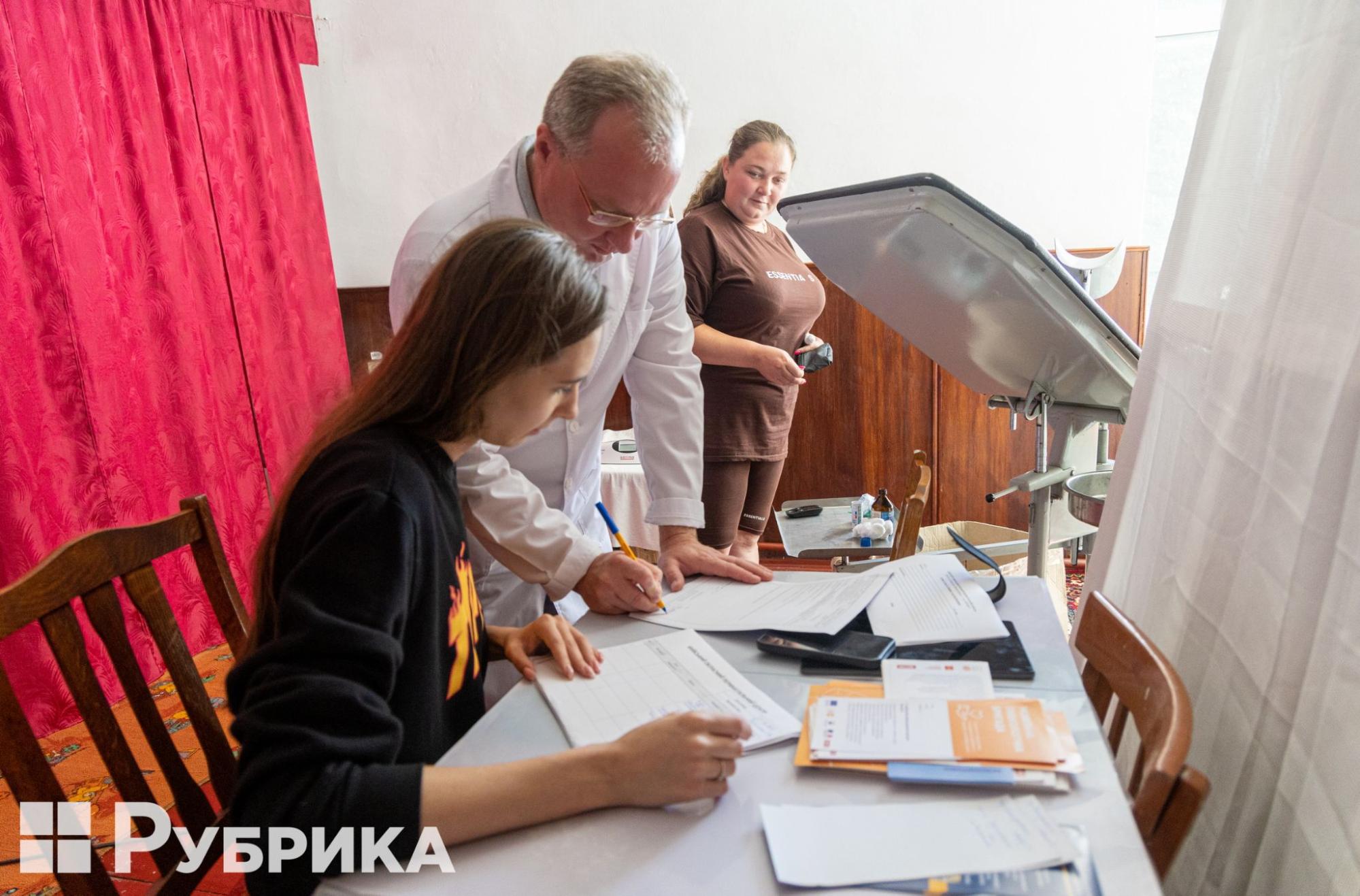
Before the appointment, doctors prepare documentation
Doctors give each client information materials with a list of the teams' services and a brochure on domestic violence.
The obstetrician-gynecologist says: "It's good that this program appeared. You know that all these services are expensive now, and thanks to UNFPA, we provide assistance free of charge. The women are very pleased that we come to them, and we are satisfied because our goal is to help women."
A mobile brigade is a solution for a village without transport connections
More than a dozen women are already waiting in the spacious hall of the paramedic post in the village of Klyuky.
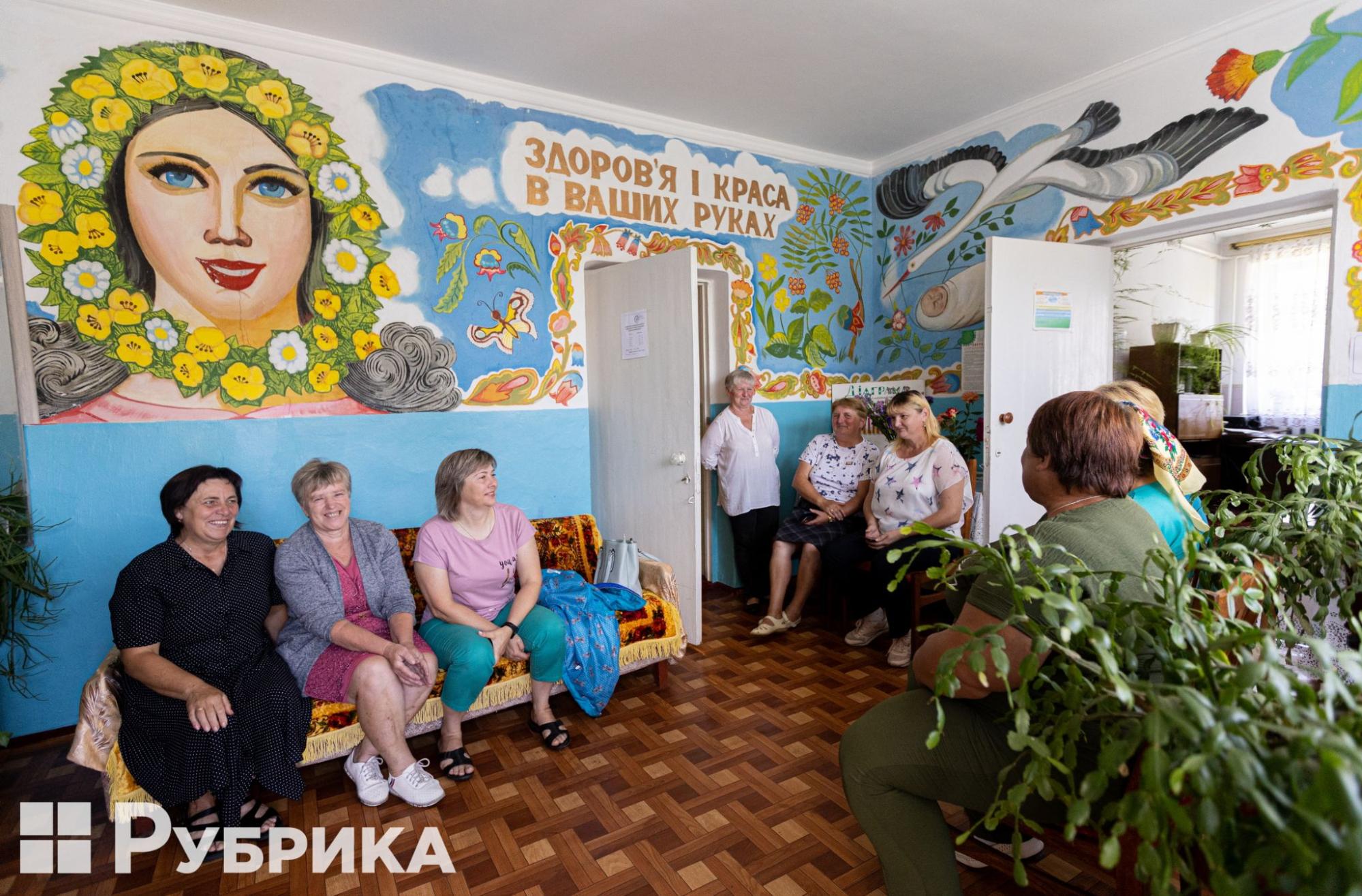
A line has formed for specialists of the mobile brigade in the hall of the paramedic post in the village of Klyuky
"When I informed about the brigade's arrival and invited the women to come, they did not believe me and asked: 'Is this free of charge? And what should we take?' I say: nothing, just come," says Valentyna Polishchuk, head of the paramedic station in the village of Klyuky.
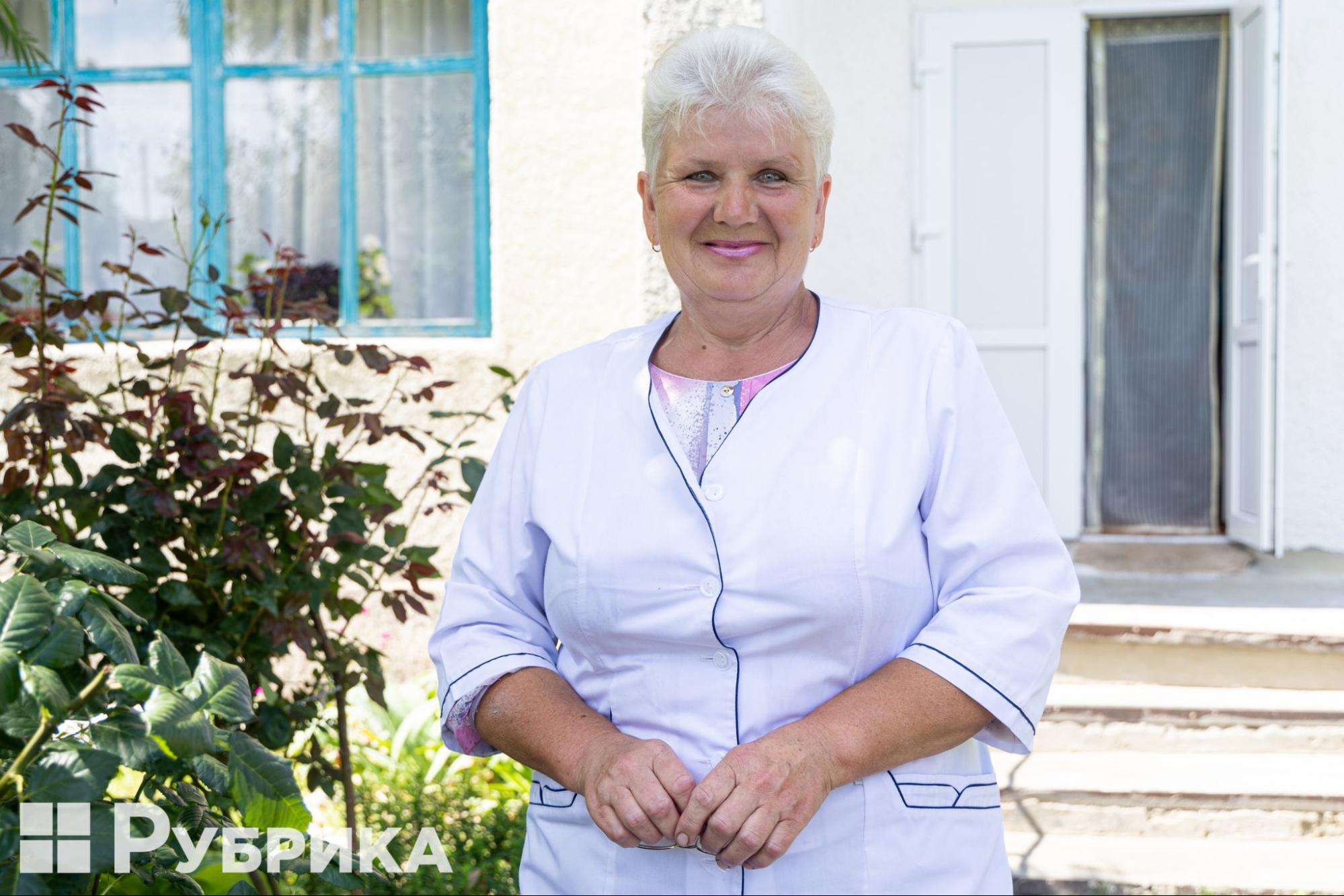
Valentyna Polishchuk, head of the paramedic station in the village of Klyuky
Polishchuk is a paramedic and the first to whom the villagers turn for help — as of the end of 2022, there were 496. For 23 years, Polishchuk has been providing assistance to residents within the scope of her competence, performing manipulations prescribed by doctors, such as IVs and injections. There is also a small pharmacy in the village.
Previously, there was a paramedic-midwifery station here, but now it is just a paramedic, with only two employees. The facility has a gynecological examination chair, so the mobile team, this time, does not use the mobile chair equipped in their special vehicle provided by UNFPA.
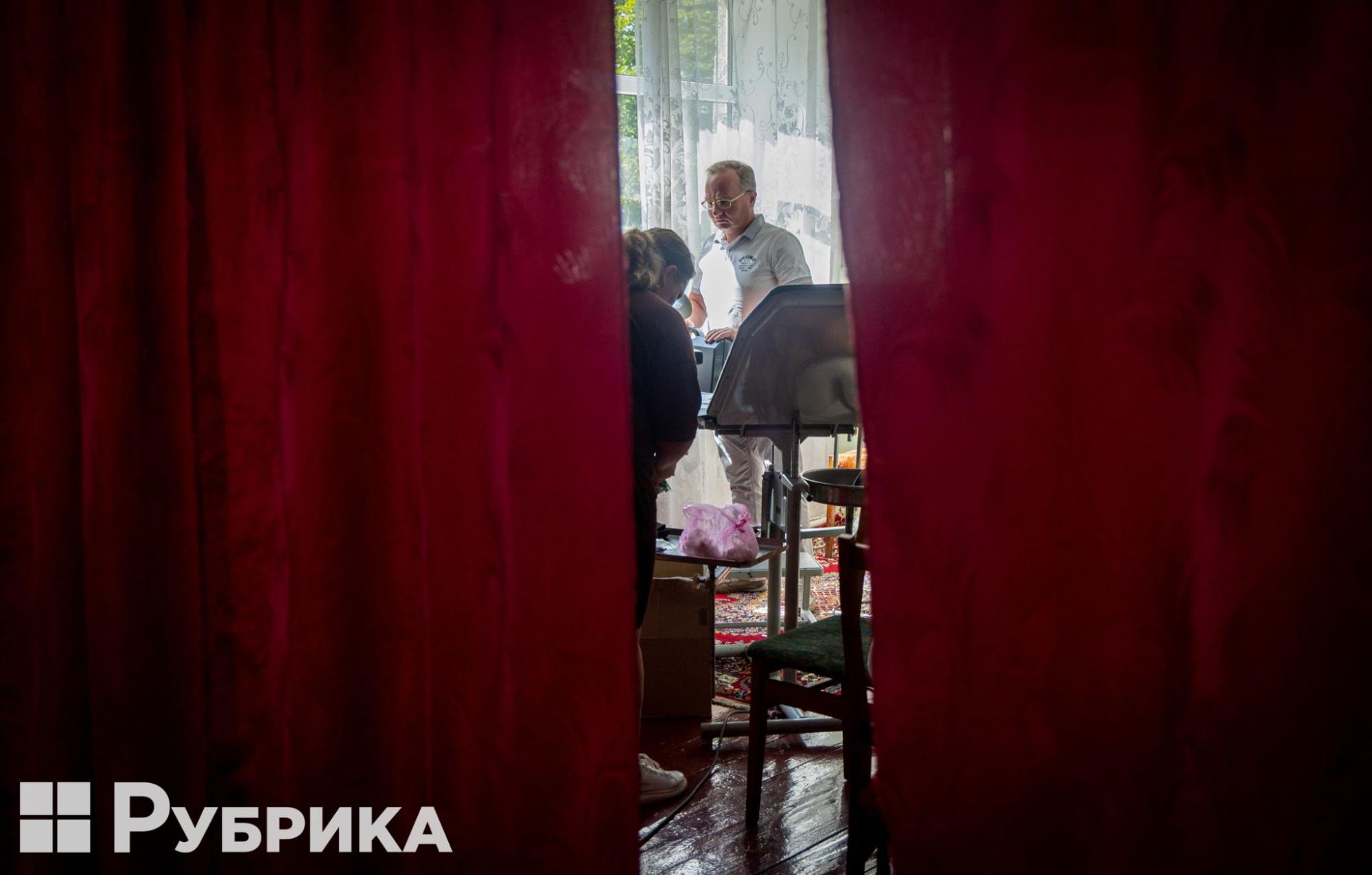
An improvised office for receiving patients in Klyuky
The nearest place for people to go to a family doctor, who can refer them to a gynecologist, is the Denyhiv medical dispensary, 13 kilometers from Klyuky.
Nowadays, there is not a single bus that goes to Klyuky. People get there by their own transport, carpooling, or hiring a car.
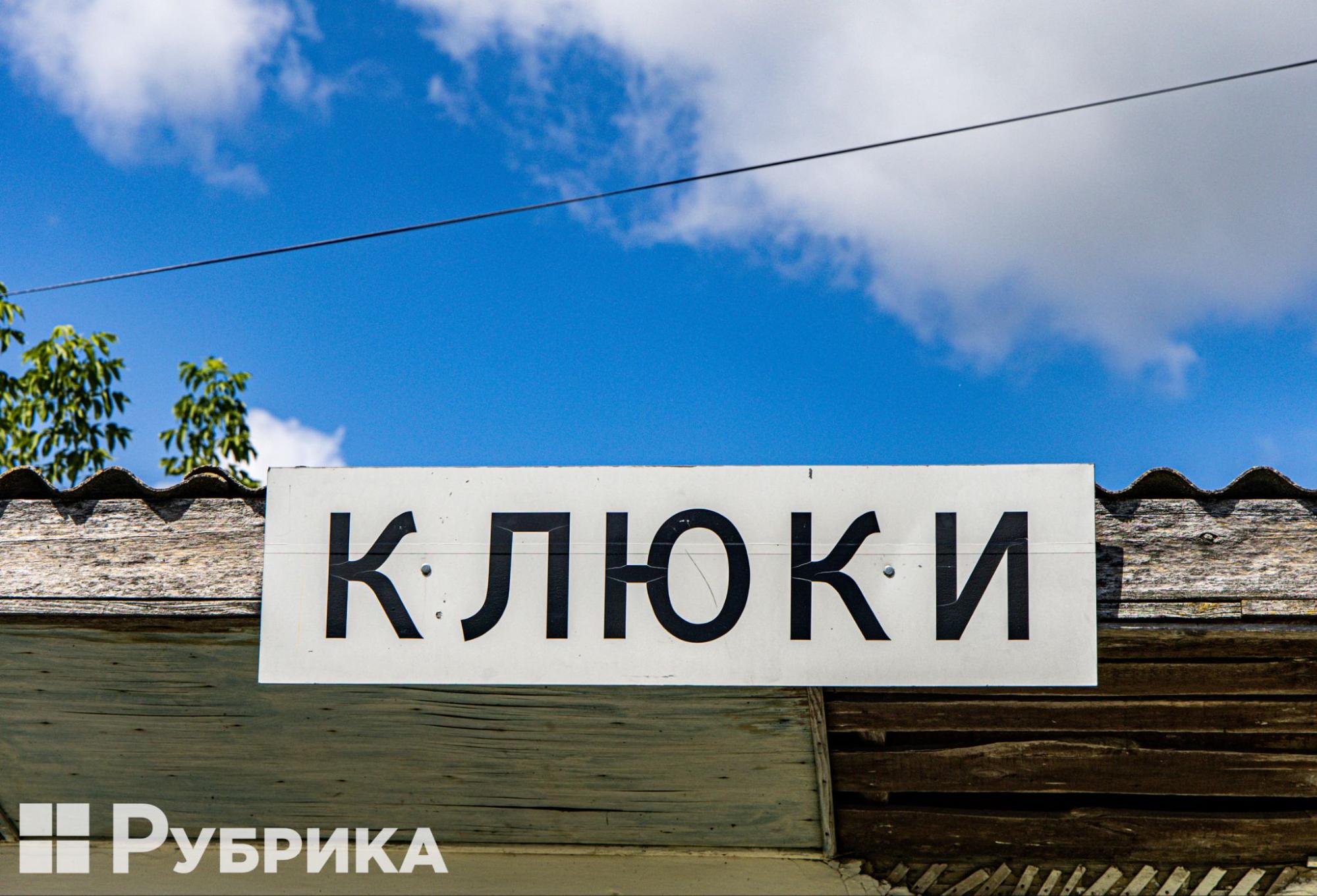
There are bus stops in Klyuky, but there are currently no regular buses
"People feel very bad about this, so it is very appropriate that such a team came to us," rejoices Polishchuk. "There were many women yesterday, and I saw that the medics were even a little tired at the end. All the women who came yesterday are delighted. Many have signed up today, and even more women are calling and asking if it is possible to come."
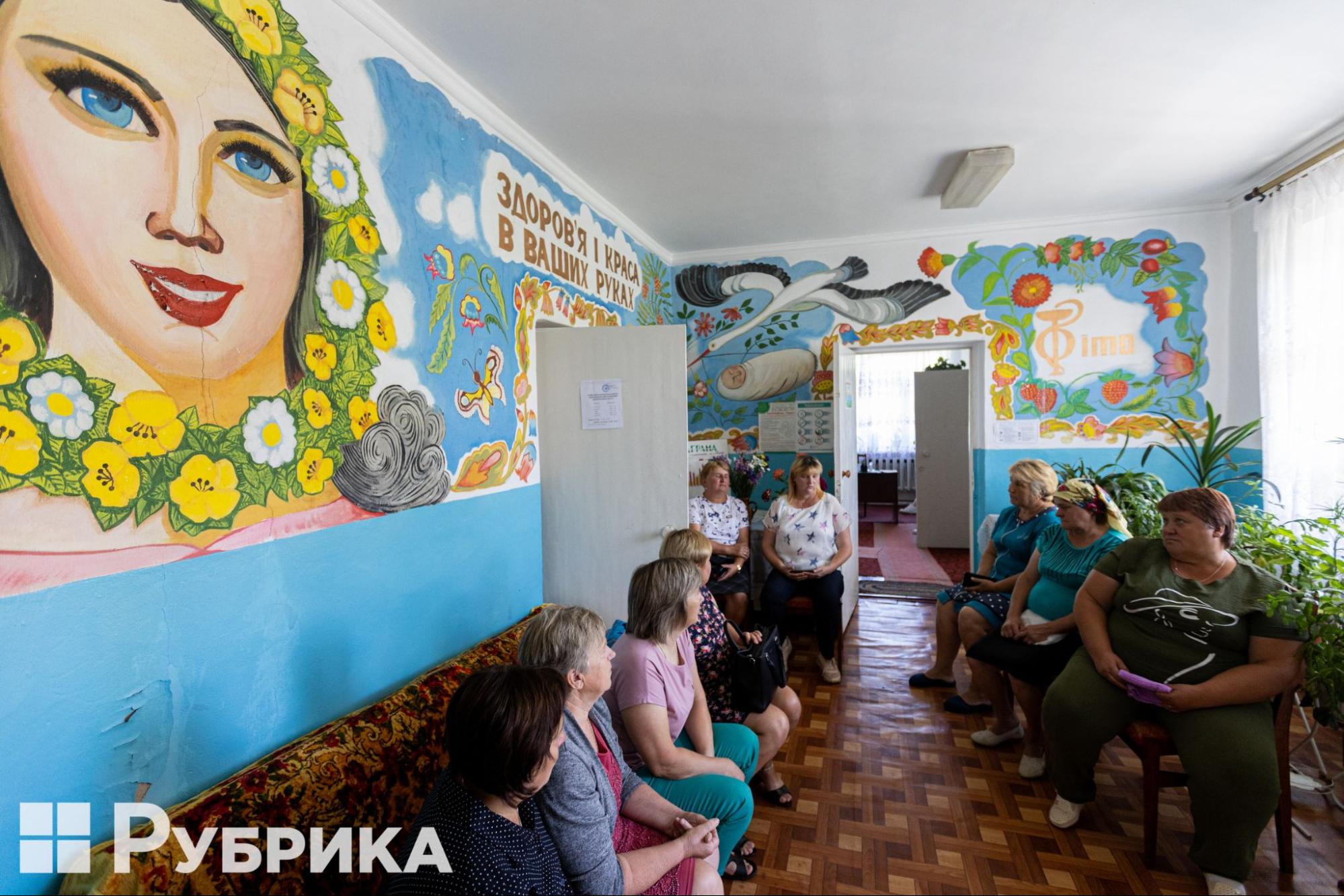
The paramedic center opened in this building in Klyuky in the 1990s, since then the repair of the building has been mainly on the shoulders of the employees of the facility
The brigade comes several times to the same settlement just in such cases — when many people are willing to come for an appointment.
Svyatnenko says that usually, in such remote settlements, five to six women first come to the appointment. "The bravest," he says with a smile. Then word of mouth starts working: others learn that the doctor is good, the attitude is good, and the queue increases to 20 or more patients.
Coordinated teamwork
Thanks to the intern doctor, the appointment is faster this day. Lagunenko takes care of entering the patient's data into the tablet, helping prepare medical reports.
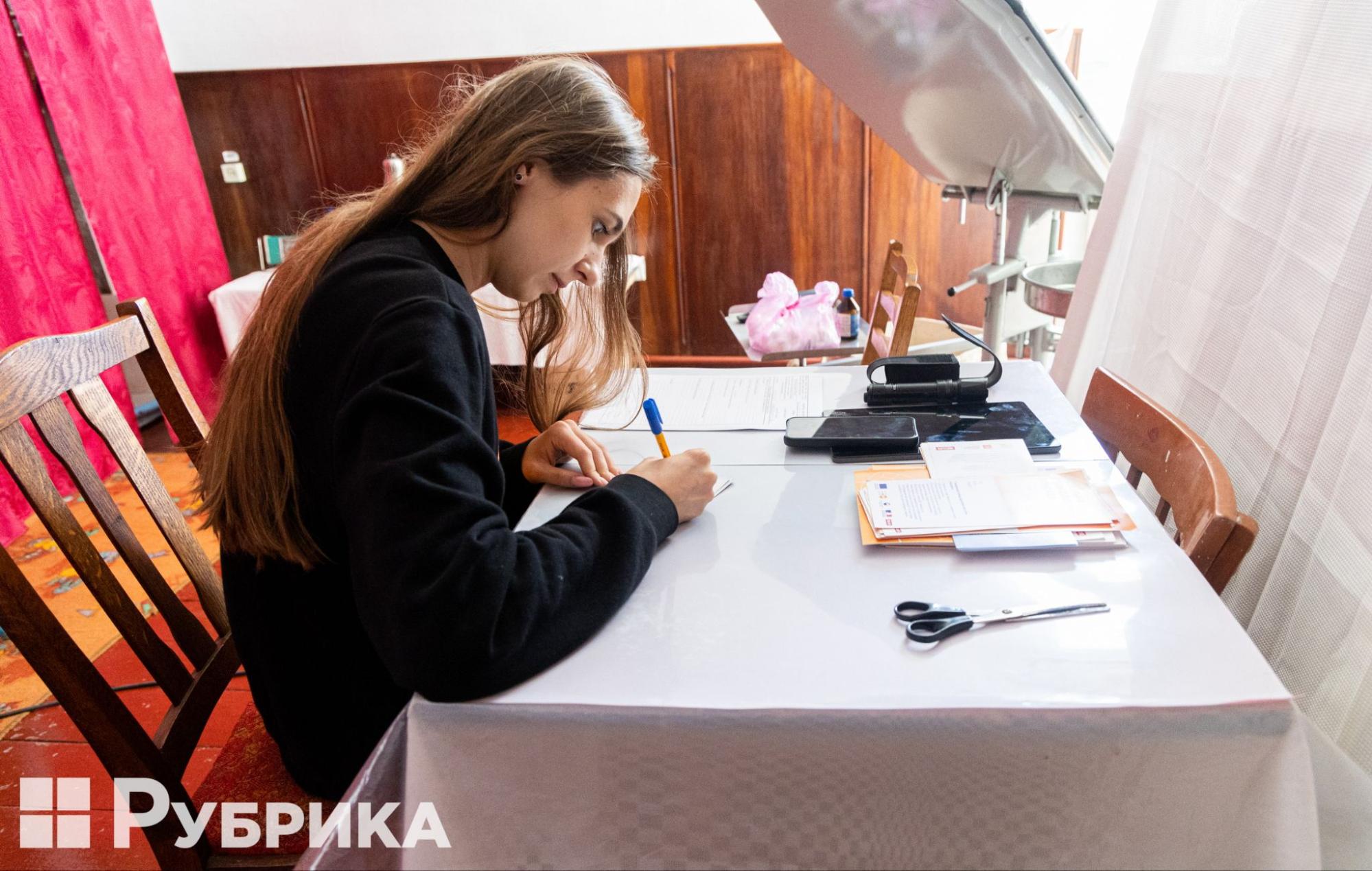
Intern doctor Alyona Lagunenko helps to fill out medical documentation
Lagunenko can also participate in the examination. "I like it here, perhaps, even more than in the hospital. Many people come with different questions. It's also interesting to watch how the doctor prescribes treatment because each doctor's approach is a little different," says Lagunenko. Three doctors are working in the mobile brigade in the Kyiv region, and they perform visits in shifts.
During her work with the team, the intern doctor was most impressed by the case when a woman who was already six or seven months pregnant came for an appointment and at the same time was not registered in the women's clinic. Specialists referred her to the Kyiv Regional Perinatal Center.
Midwife Mirets assists the doctor during the examination and performs a blood sugar test. Zoya Klymenko, one of the Klyuky patients, is happy that her sugar level is normal.
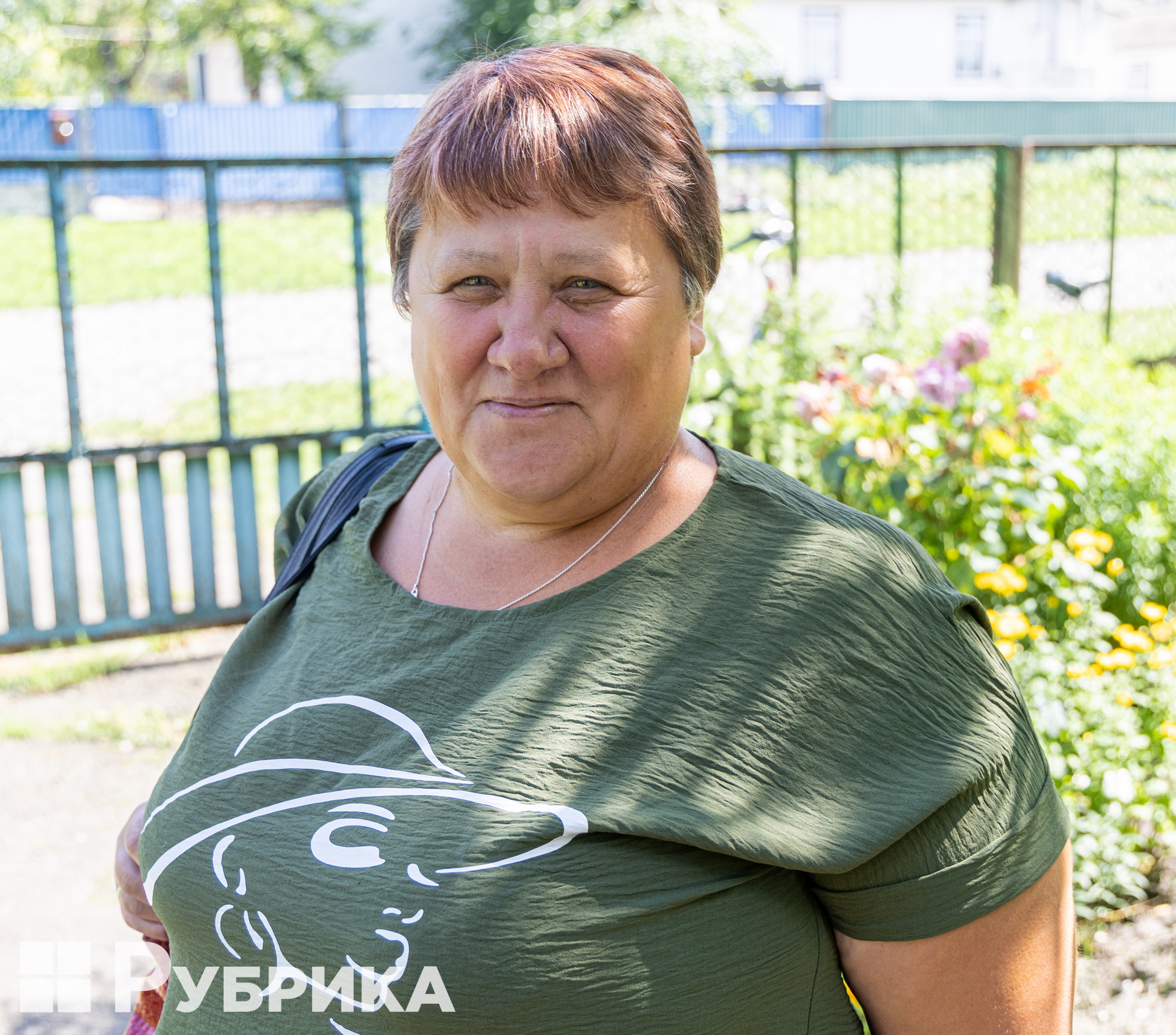
Mobile brigade client Zoya Klymenko
Mirets says the work is not difficult and interesting: "Many people come to us who find it difficult to get to the nearest gynecological department or doctor. It's nice to help them."
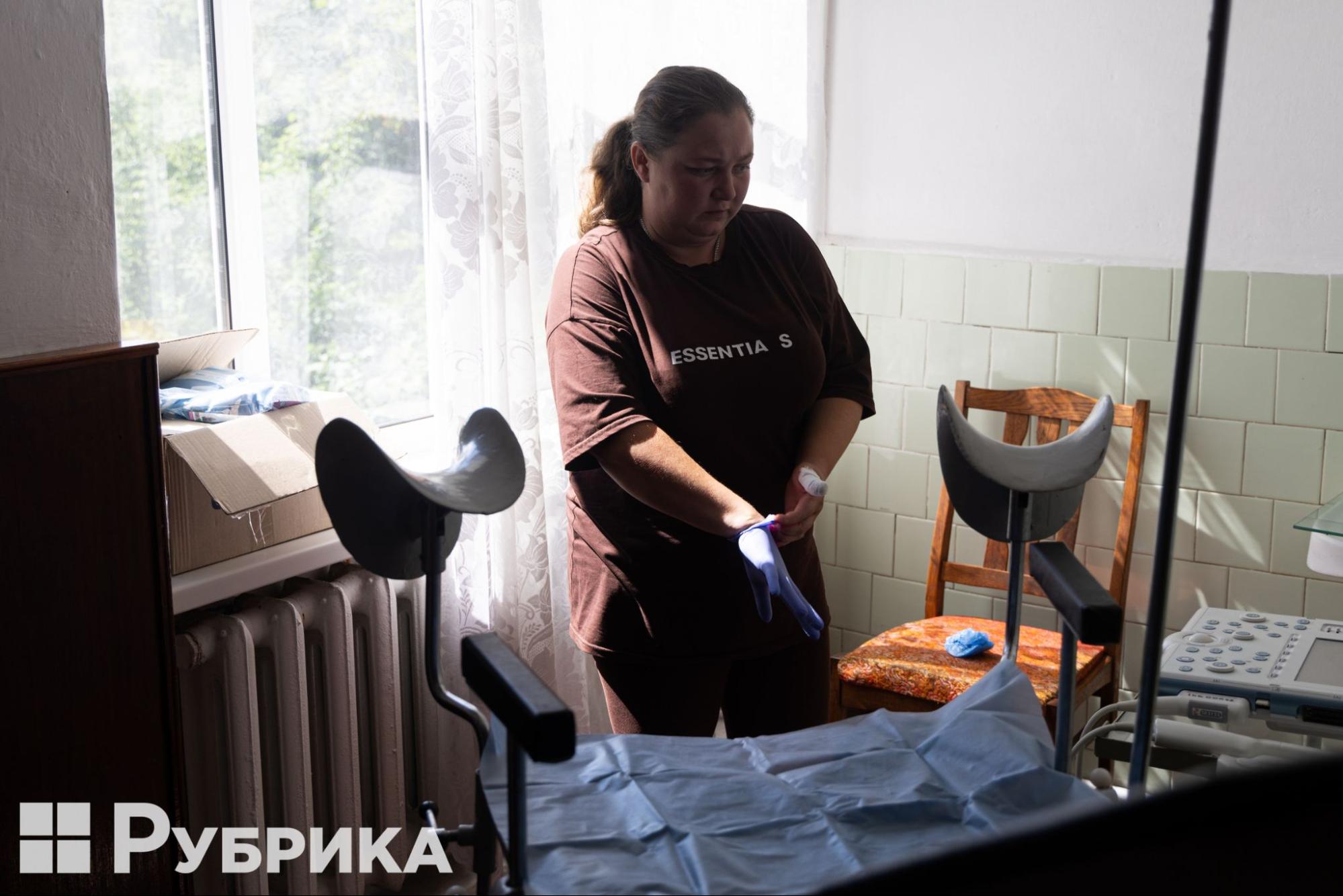
Vita Mirets, a midwife of the mobile brigade, is preparing to start work in Klyuky
The mobile team midwife emphasizes that all patient data remains confidential: the team records only the patient's year of birth, diagnosis, and contact number in their documents, and only for feedback when UNFPA needs to check the quality of the specialists' work. According to the visit results, each woman receives a medical opinion.
The visit of the mobile team as an incentive to take care of yourself
Patients leave the doctor's office satisfied and always thankful for the opportunity to receive qualified help almost at home, free of charge.
"The doctor communicates in a very friendly manner. It's a good thing that they go around the villages because now there are no buses to Tetiiv, the former district center, so getting there is not always possible," shares Klyuky resident Maria Shostakivska.
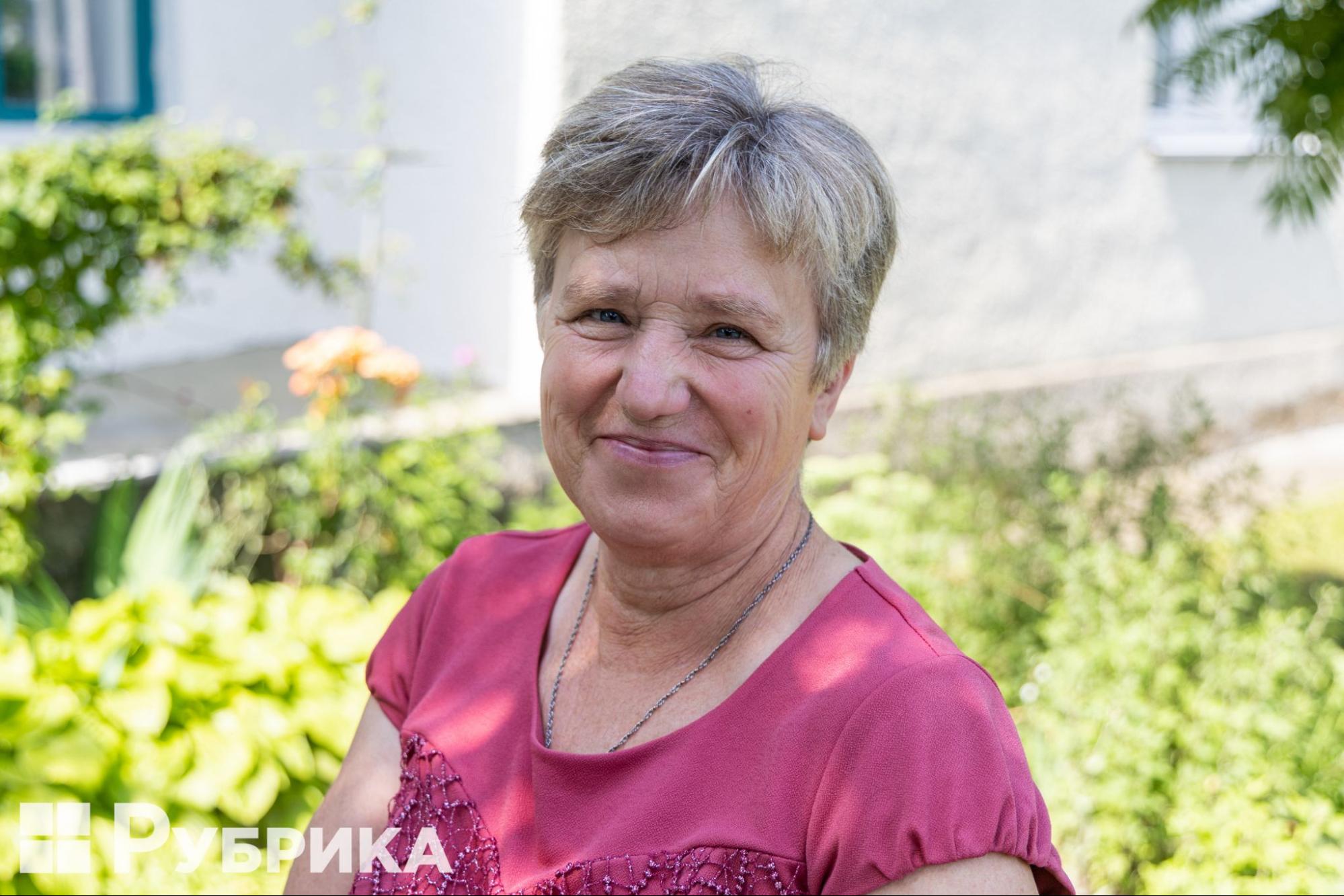
Maria Shostakivska, a client of the mobile brigade
Another client of the mobile brigade, Nataliia Kulaeva, notes the high qualification of the doctor who came to provide medical services to people: "Good attitude, explained everything well, performed a painless examination."
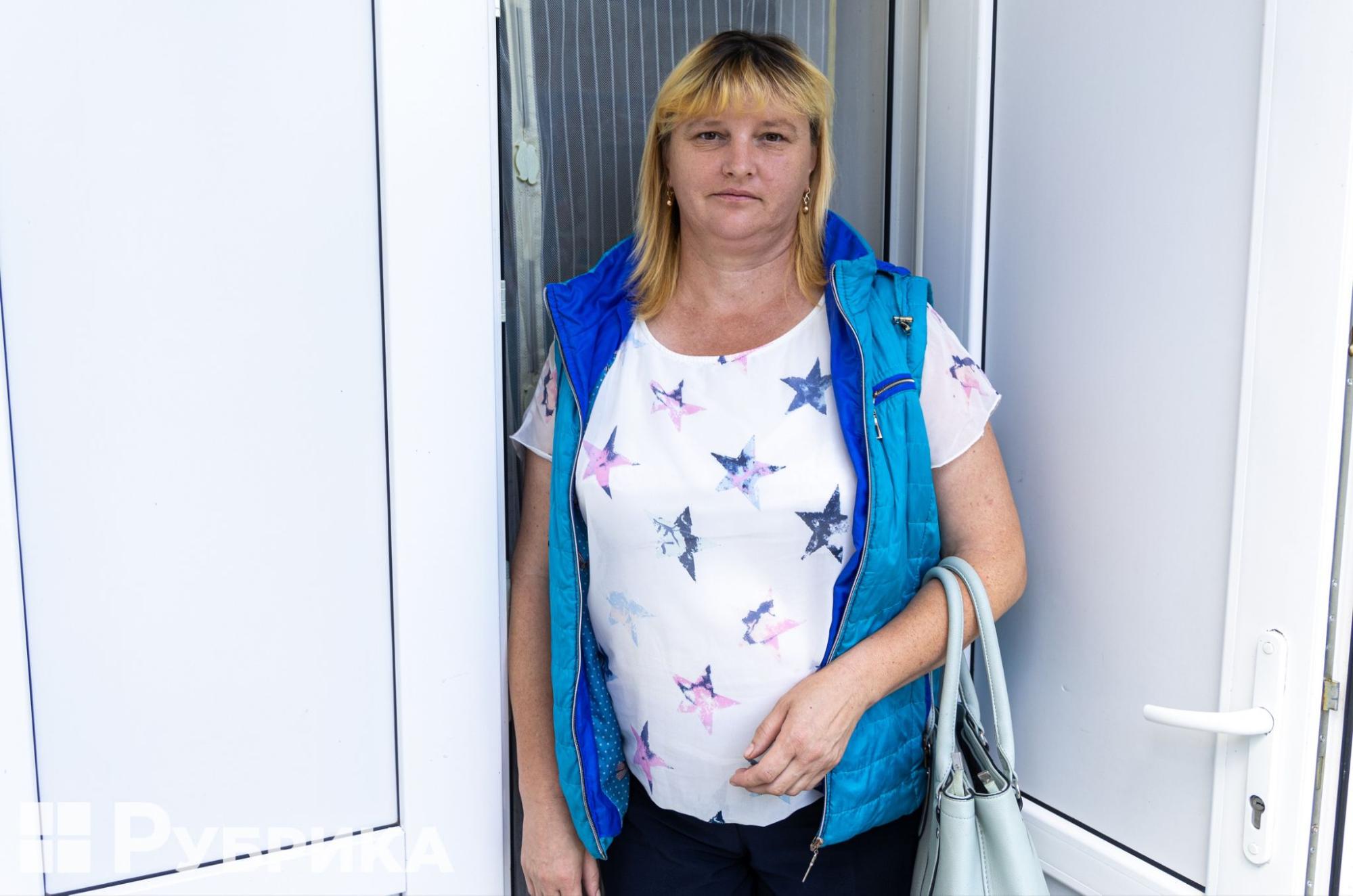
Nataliia Kulaeva says that the visits of the mobile brigade are especially important for older adults, for whom it is even more challenging to get out of the village for medical care
Kulaeva also says that the work of the mobile brigade is very important for older people who will not travel to see doctors from a remote village.
"Of course, the need for such services is great because many people will not go to Tetiiv at all," says Kateryna Zagorna. "The doctors behaved very well and looked well; I liked it. This is very important because not everyone in our village properly takes care of their health. Those who, for example, do not have a job requiring annual medical examinations do not visit doctors. You need to take care of your health, but everyone dismisses it. If something hurts a little, it will go away. If the doctors came to the village, no one would be too lazy to get here."
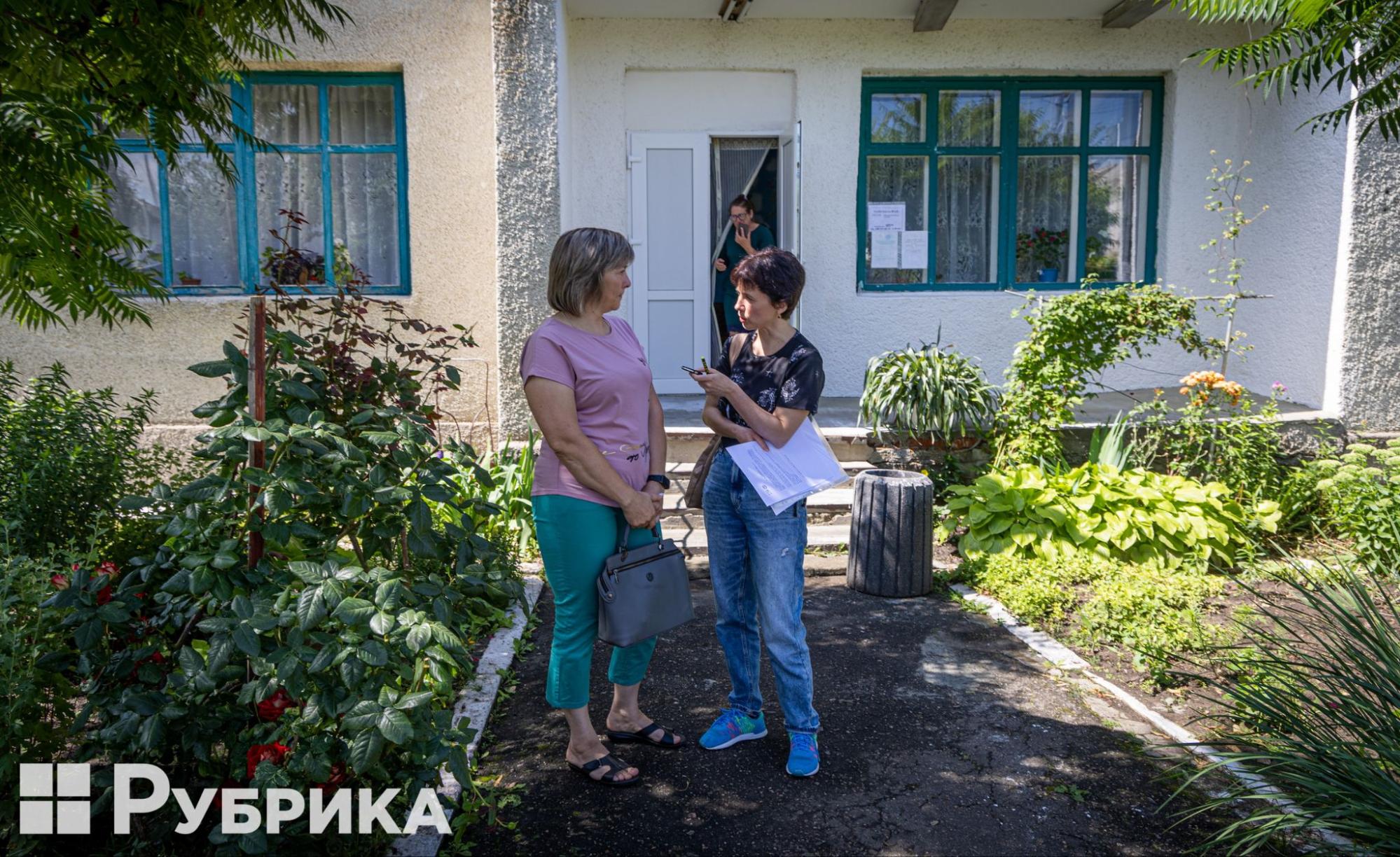
Kateryna Zagorna (left) says that, unfortunately, many villagers do not take enough care of their health
"This is the first gynecologist I liked"
Diana Shcherban, a young mother of three girls, advises all women not to be afraid to go for checkups.
"My neighbor told me there was such an opportunity, and without thinking twice, she told me to sign up for the queue immediately. The doctor made a good impression, a very nice person. I really liked the approach and how he explained everything in an accessible way. To be honest, this is probably the first gynecologist that I really liked the doctor, and everything was as it should be," says Shcherban.
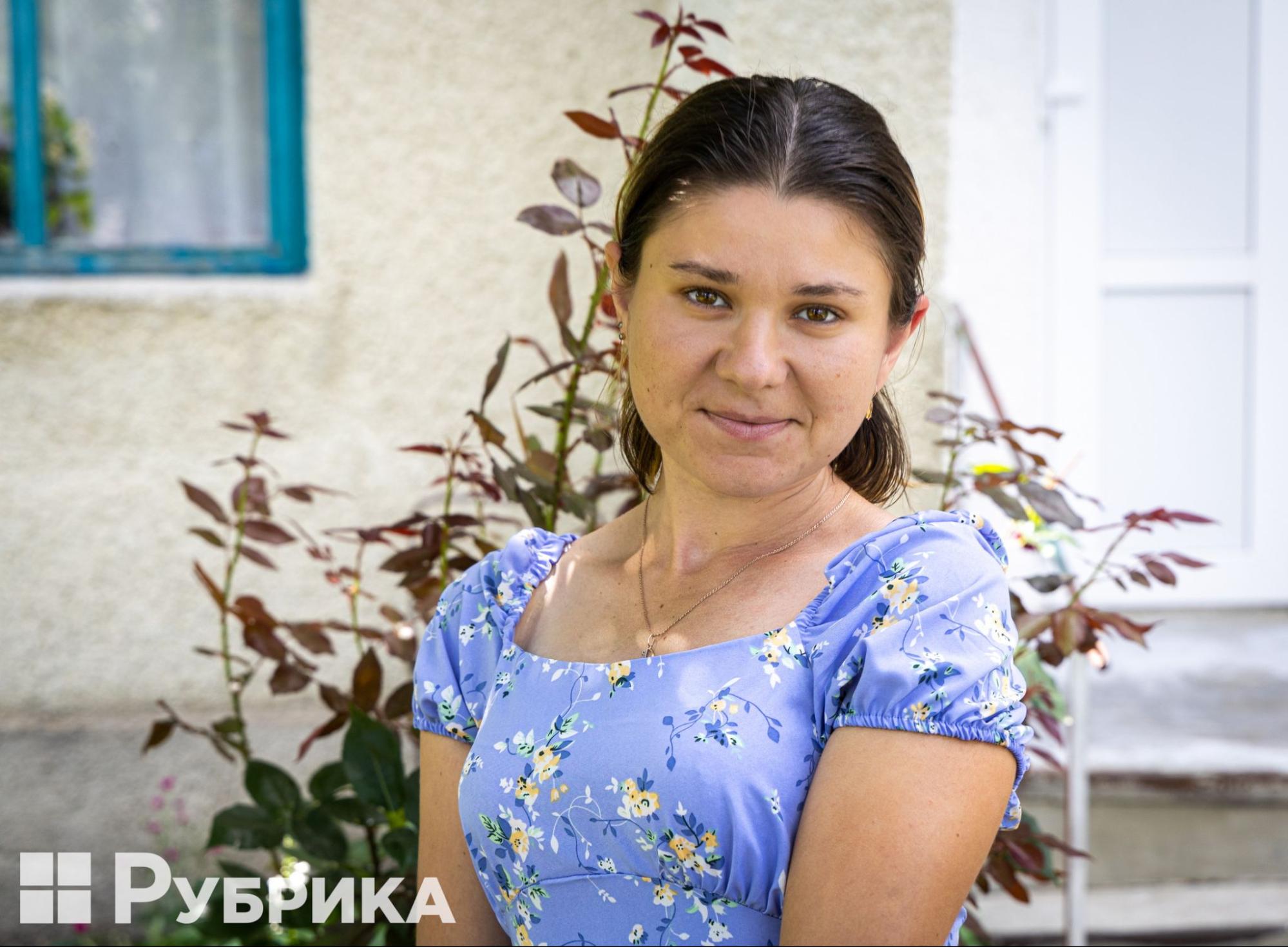
Diana Shcherban, a client of the mobile brigade, urges women to get regular medical check-ups
Shcherban says that she never engages in self-medication, and if the children are sick, she also takes them to the first aid station or the hospital: "I think that you should go to a gynecologist twice a year. If necessary, you should go immediately, not postpone. The same goes for other specialists. Our paramedic will always help, advise, and take a look."
Like other residents of Klyuky, Shcherban complains about the lack of buses to nearby Denykhivka or Tetiiv, where you can get medical help.
Viktoriya Klymenko, deputy director of the Klyukiv educational association, also emphasizes that it is better to come for an examination to prevent the disease than to neglect yourself and receive treatment too late.
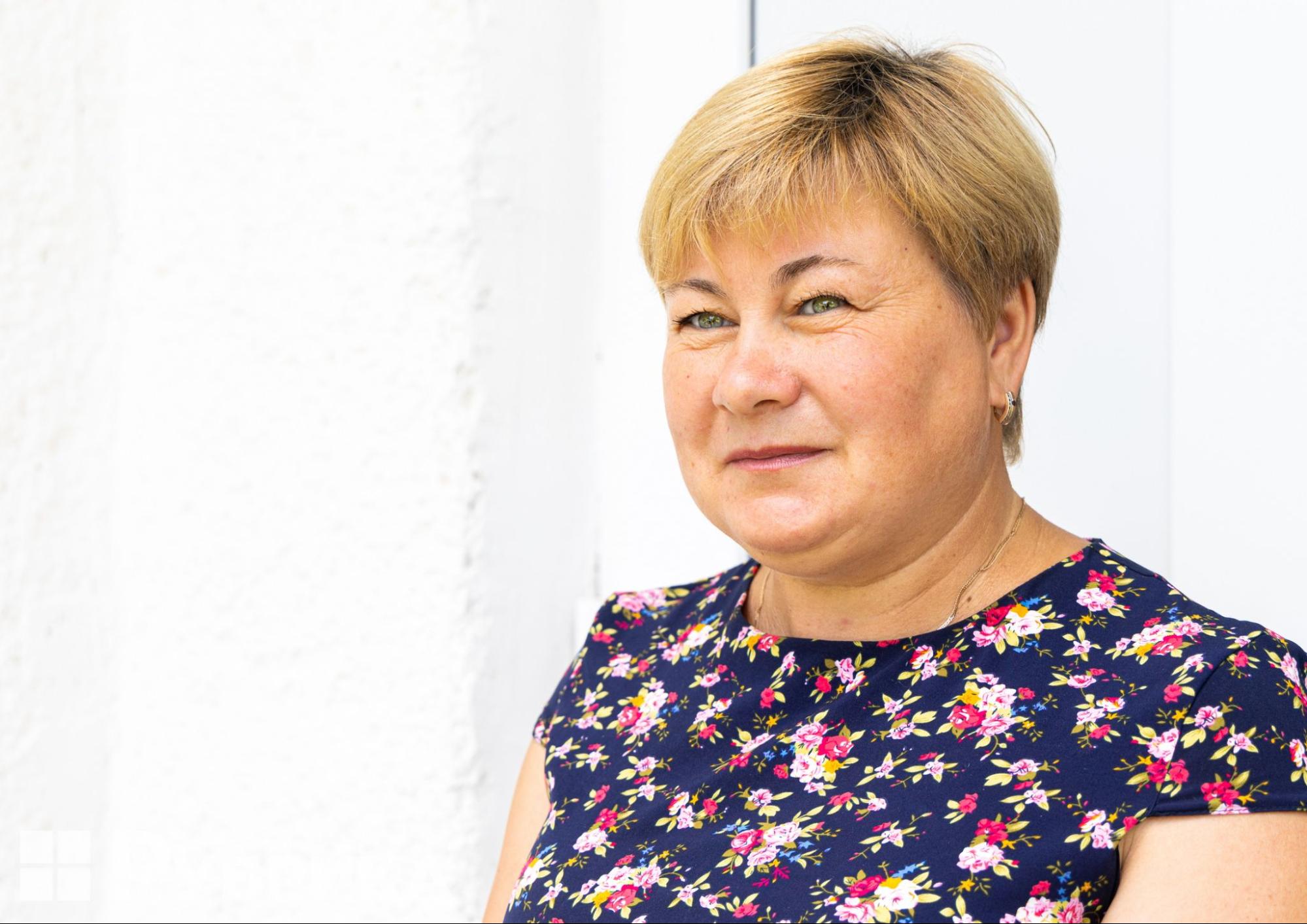
Victoria Klymenko, a client of the mobile brigade, emphasizes that it is necessary to contact doctors on time and not to miss the opportunity to be examined
"We live in a village far from the district center, so we are very grateful that there is such a program for providing medical services to women," says Klymenko.
In this regard, the obstetrician-gynecologist of the mobile brigade cites the example of a resident of one of the villages of the Kyiv region who did not consult a gynecologist for 30 years and finally came to the brigade for an appointment with a big problem.
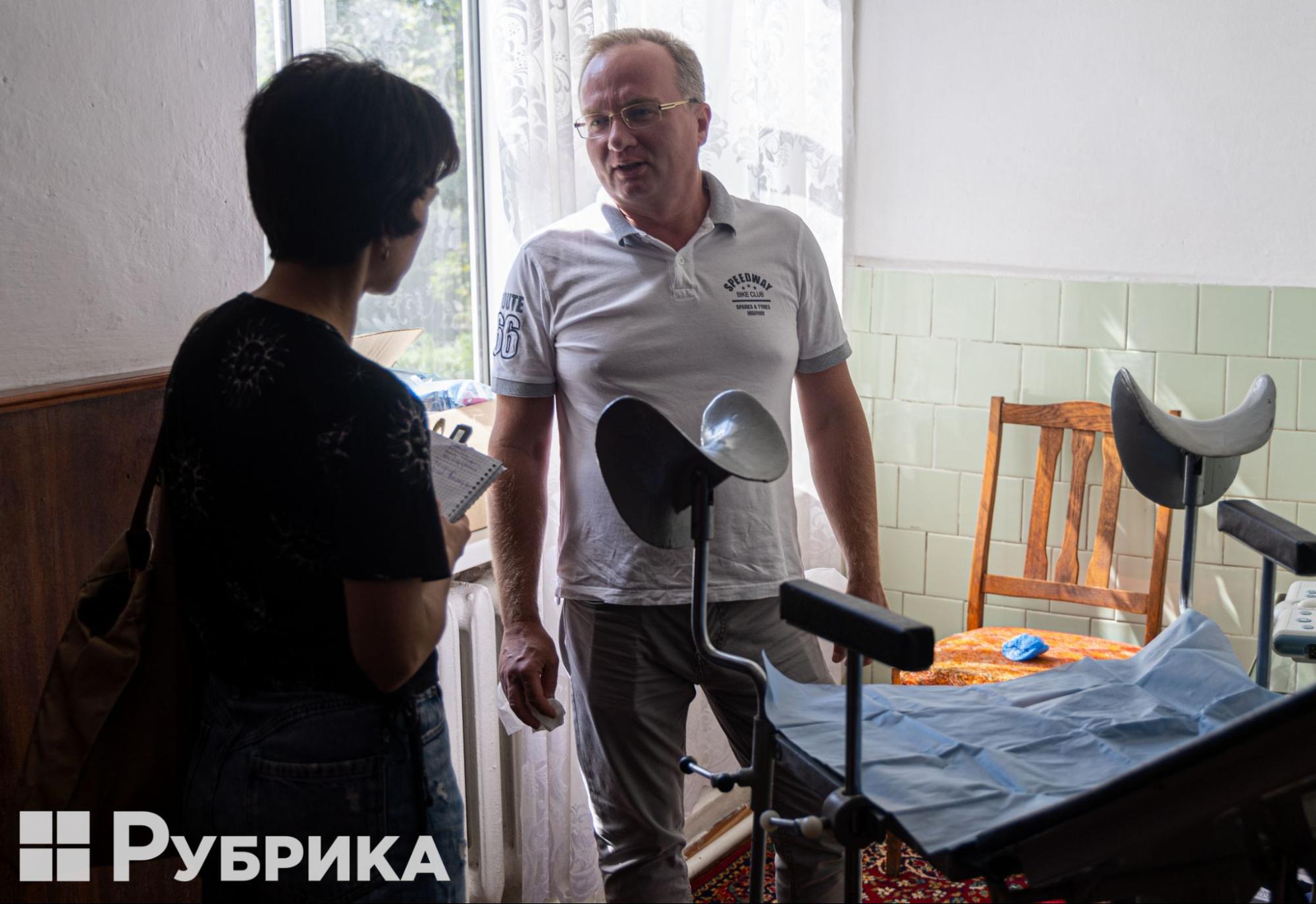
Doctor of the mobile brigade Oleksandr Svyatnenko. He is happy to be able to help so many women
"This problem required surgical intervention twenty years ago," explains Svyatnenko. "She waited, and it resulted in a rather complicated situation. We sent her for operative treatment. This woman is currently being examined and should soon come for surgery."
"In general, women are healthy in Klyuky"
"In general, the women in this settlement are healthy," summarizes the reception day in Klyuky, doctor Svyatnenko. "However, some women had pathological conditions and were advised surgical treatment, a few — for further examination at our clinic, a few — to a family doctor. We worked very actively and well."
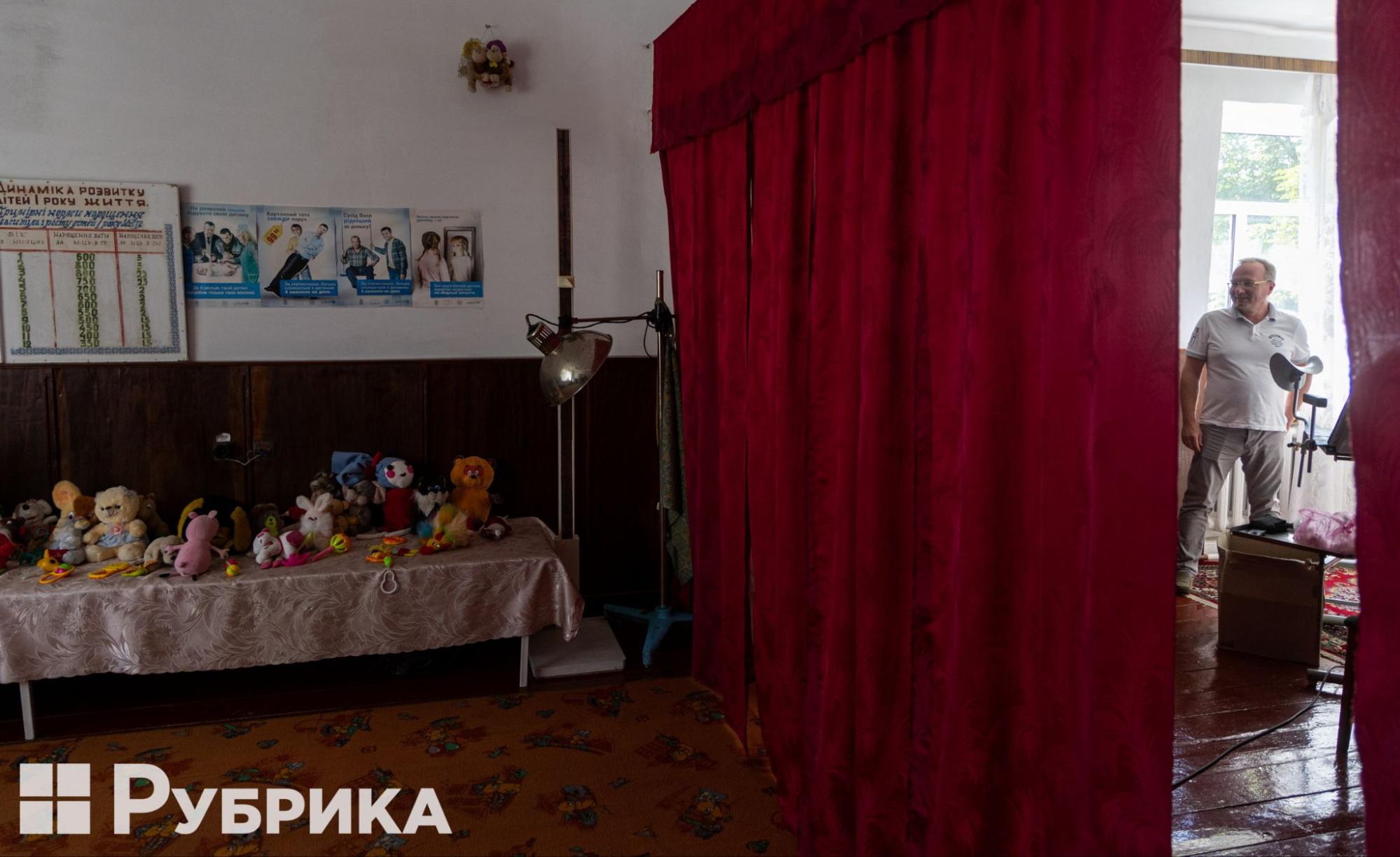
The office for receiving patients in Klyuky was arranged
The doctor thanks UNFPA for the provided equipment, in particular, an ultrasound machine, a chair, a colposcope, and rapid tests, because all this improves the quality of the work of doctors.
"What we see with our hands during the examination may not be enough. Many pathologies are detected with the help of an ultrasound diagnostic device." The obstetrician-gynecologist says these are fibroids, changes in the endometrium, cysts, changes in the ovaries, and inflammatory processes. "This ultrasound device with a vaginal sensor helps a lot." The doctor adds that working in a mobile gynecological team is an excellent experience from a professional point of view.
Does it really work?
"People will be grateful if this practice continues"
"After a discussion with the residents of my district, I realized that this service is essential for people," says Lyudmyla Slipenchuk, head of the Denykhiv district, which includes the Klyuky village.
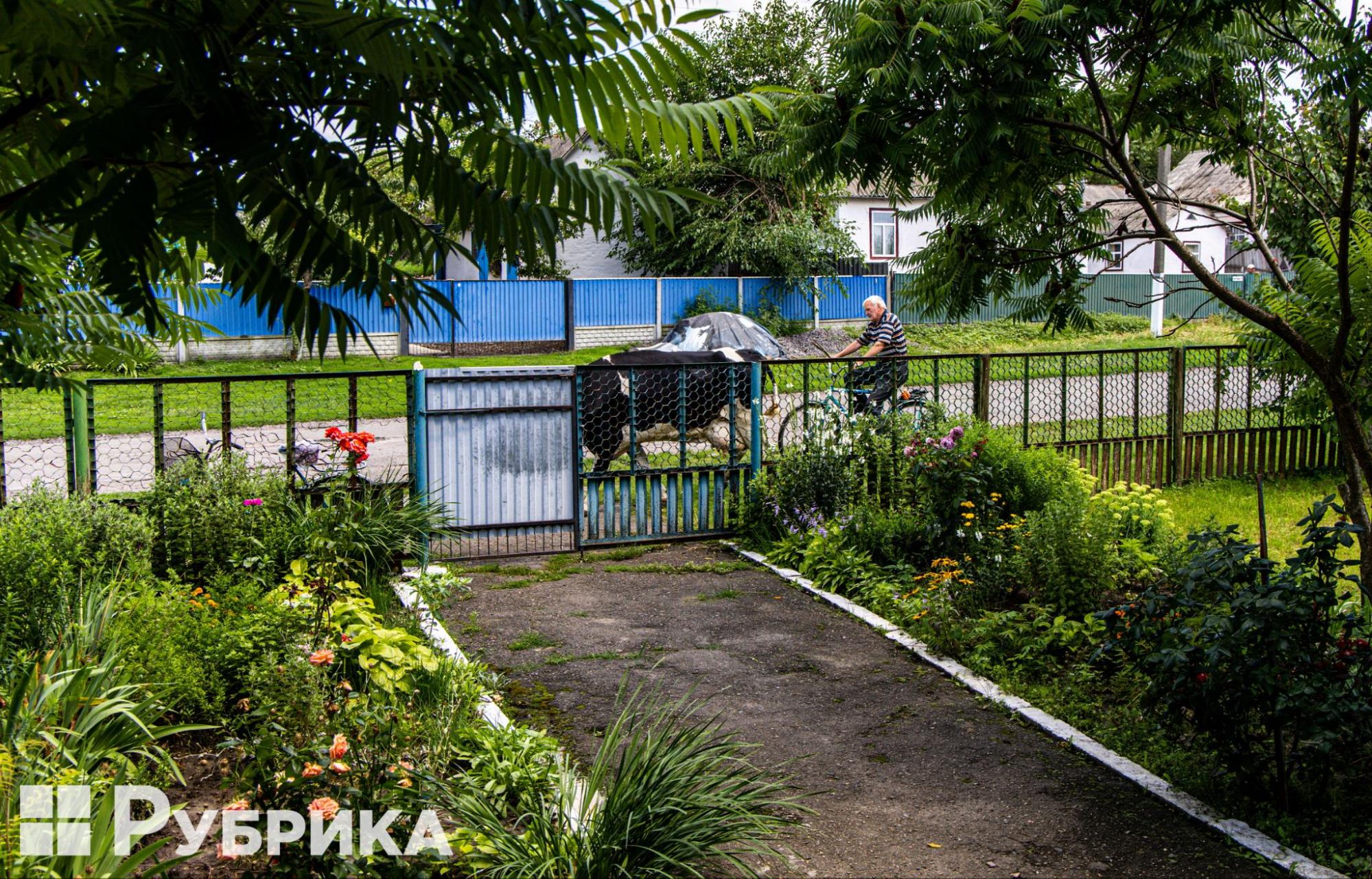
Central street of Klyuky. Many residents run households
Slipenchuk explains that since the villagers are preoccupied with their household chores, they, unfortunately, spend very little time on themselves and taking care of their health.
"Such visits to gynecologists are essential for women because now few men are in the village, and many are drafted into the Armed Forces of Ukraine. All the work is on the woman's shoulders, and she sometimes performs too much work and devotes even less time to her health," says Slipenchuk. "The team came for the second day in a row, and the female visitors are delighted that there is a professional gynecologist, an ultrasound examination, and glucose analysis."
There are 12 villages in Slipenchuk's district, and each is eagerly waiting for this visiting brigade, says the head: "It's good that there is an employee at the Klyuky paramedic station who called everyone and told them about this mobile team. I will also tell the assistants to advertise and get as many people as possible. It really is an effective and vital service for our women. People are grateful. If this practice continued, the communities of all villages would be even more grateful."
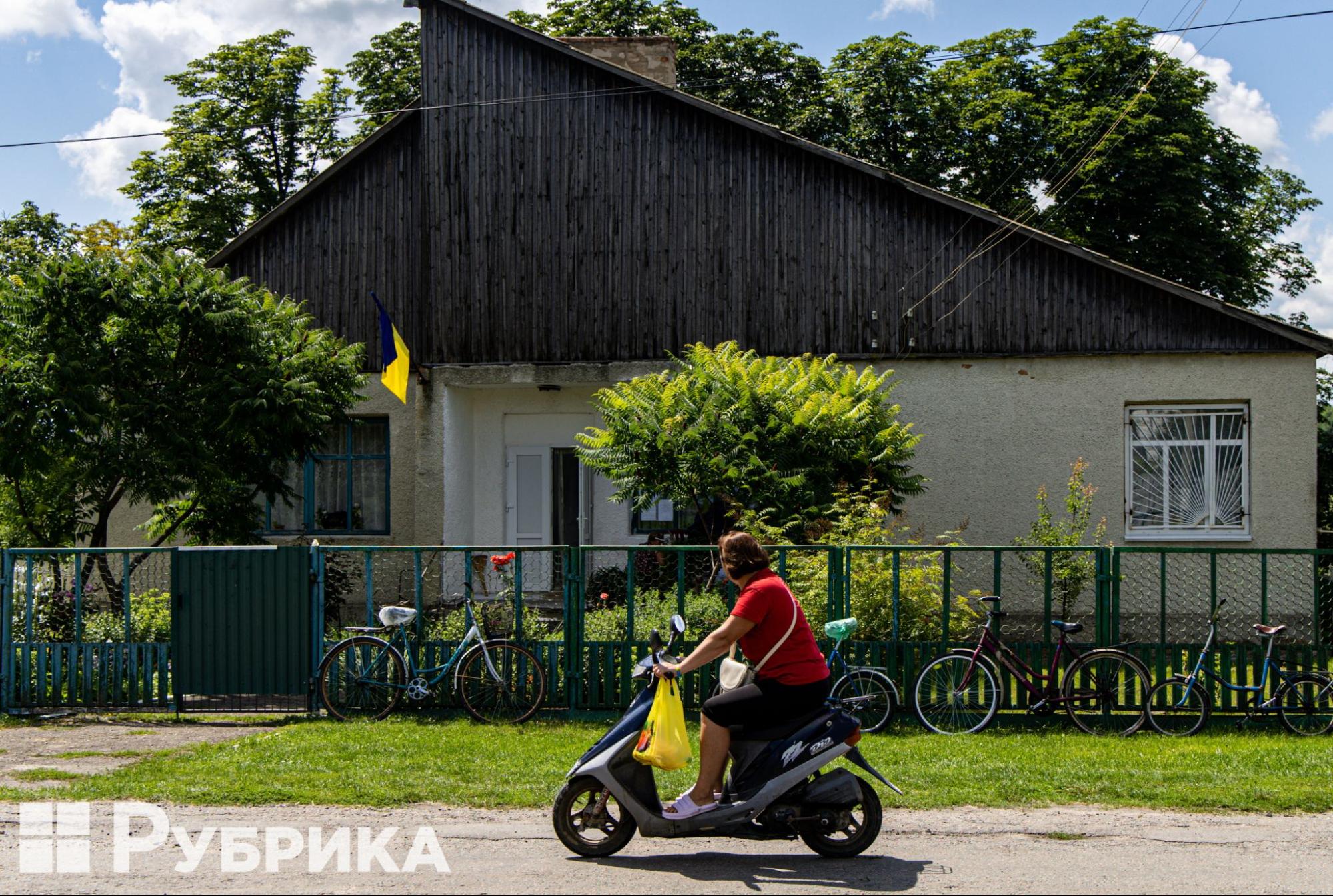
Two-wheeled transport is common for many residents of Klyuky
Mobile gynecological teams and gynecological offices with barrier-free access work within the framework of humanitarian response measures of UNFPA, the United Nations Population Fund, with the financial support of the European Union (EU), the Ministries of Foreign Affairs of Denmark, France, and the Republic of Korea.
Photo by Mykola Tymchenko






